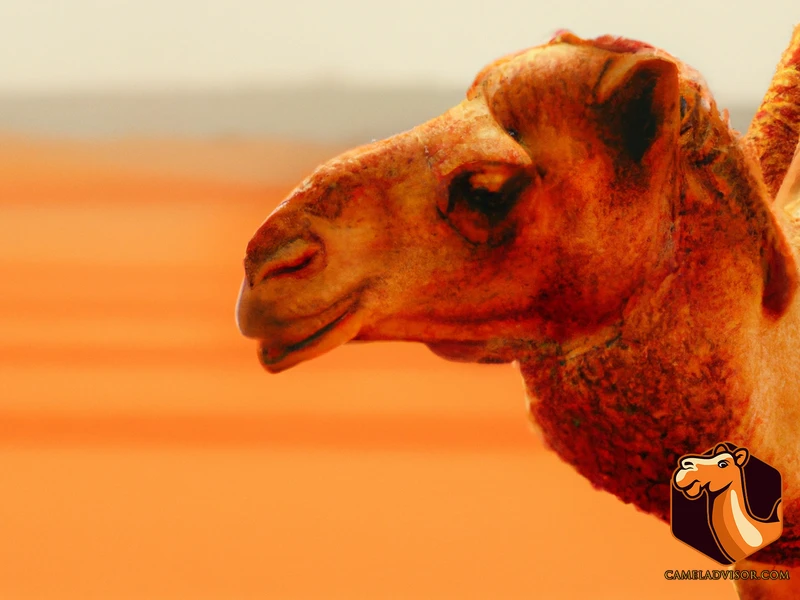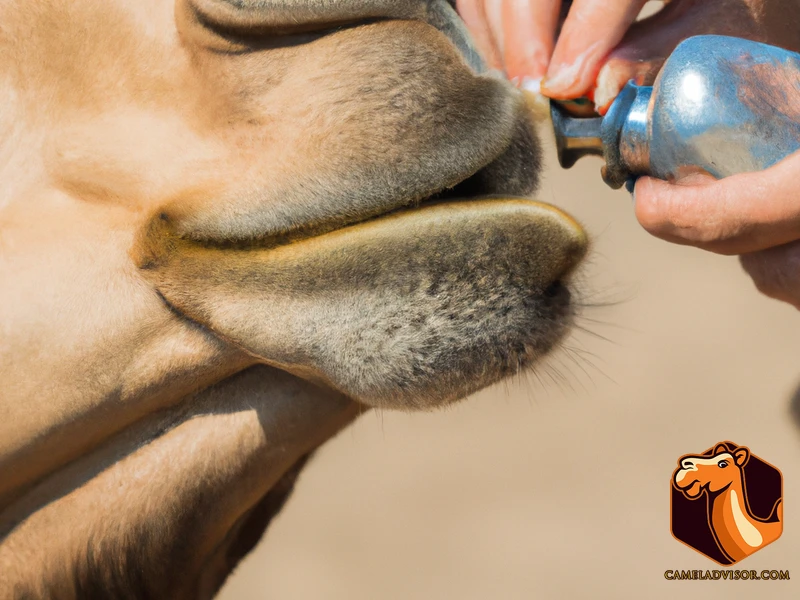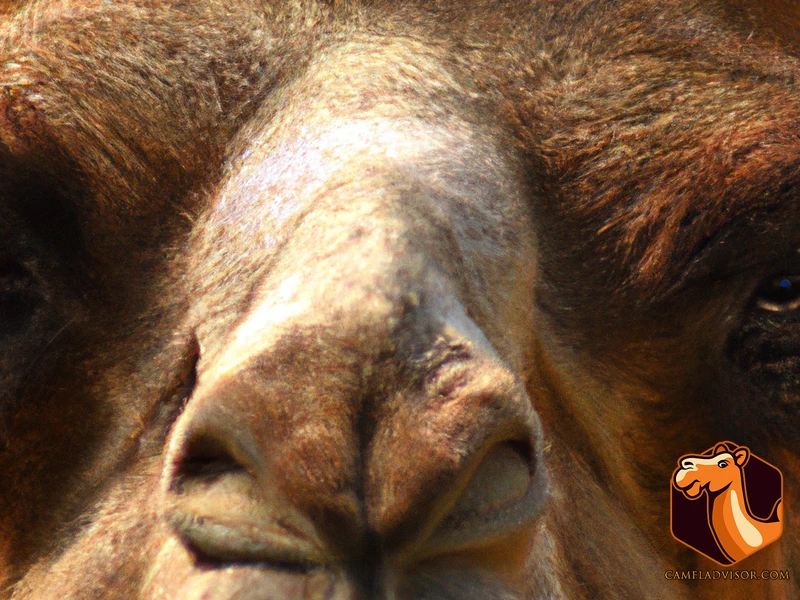The health and well-being of camels is of utmost importance, as they are essential in many societies for transportation, milk, and meat. However, despite being hardy creatures, they can suffer from various vitamin deficiencies that can have serious consequences for their health. In this article, we will explore the causes, symptoms, and treatments of vitamin deficiencies in camels. By understanding these issues, we can take better care of these vital animals and ensure their longevity and vitality.
Contents
- Causes
- Symptoms
- Treatments
- Prevention
- Conclusion
-
Frequently Asked Questions
- What are camels’ common sources of Vitamin deficiencies?
- What Vitamins do camels need?
- What is the effect of Vitamin A deficiency in camels?
- What is the effect of Vitamin D deficiency in camels?
- What is the effect of Vitamin E deficiency in camels?
- What is the effect of Vitamin K deficiency in camels?
- How are Vitamin deficiencies diagnosed in camels?
- What is the best way to prevent Vitamin deficiencies in camels?
- What are the common sources of Vitamin supplements for camels?
- How long does it take for camels to recover from Vitamin deficiencies?
- References
Causes

It is perplexing to determine the primary causes of vitamin deficiencies in camels. Various factors contribute to vitamin deficiencies in these animals, including poor nutrition and diseases. Proper feeding practices can prevent vitamin deficiencies in camels, so it is essential to provide them with a balanced diet that meets their specific nutritional needs. For more information about feeding camels, see our article on a balanced diet for captive camels.
Poor Nutrition
Poor nutrition is one of the main causes of vitamin deficiencies in camels. Camels that are not fed a balanced diet containing all the necessary vitamins and minerals are more likely to suffer from deficiencies.
Camels require a diet that is high in fiber, low in protein, and moderate in fat to thrive. They also need a steady supply of fresh water. If a camel’s diet is deficient in any of these areas, their health can be adversely affected.
One issue that camel owners may encounter is overfeeding or underfeeding their camels. Overfeeding can lead to obesity, which can cause health problems, while underfeeding can lead to malnutrition and deficiencies. It is important to follow proper feeding practices and ensure that camels are not given too much or too little food.
Camels also need a specific balance of minerals, including calcium and phosphorus, to maintain strong bones. If they are not getting enough of these minerals in their diet, they are at risk of developing bone disorders. More information on camel bone health requirements can be found here.
Feeding camels salt is another common practice, but it is important to be aware of the benefits and drawbacks before deciding whether or not to include it in their diet.
A well-balanced diet is the best way to avoid vitamin deficiencies in camels. Owners should ensure that their camels are receiving the appropriate amount of fiber and water, and that their diet includes all necessary minerals and vitamins. More information on specific dietary requirements for camels can be found here, as well as proper feeding practices during pregnancy and lactation here.
Diseases and Infections
Diseases and infections can also cause vitamin deficiencies in Camels. Certain health conditions can interfere with the absorption and utilization of vitamins in the body. For example, parasitic infections can lead to low vitamin B12 levels, causing symptoms such as fatigue and weakness in camels.
Additionally, gastrointestinal diseases can also have a significant impact on vitamin absorption. Gastrointestinal problems, such as diarrhea or inflammation of the intestines, can interfere with the camel’s ability to absorb vitamin A, D, E, and K. These vitamins are fat-soluble and need bile acids from the liver for proper absorption.
Furthermore, oral diseases can also cause problems with vitamin intake. Camels with dental issues who have difficulty chewing or swallowing food may also have difficulty obtaining the necessary vitamins from their diet.
It is essential to keep up with regular check-ups with a veterinarian to detect any potential diseases or infections that could contribute to vitamin deficiencies in camels.
Diseases and infections could cause vitamin deficiencies in camels. Parasitic infections, gastrointestinal diseases, and oral diseases are some of the factors that could interfere with the absorption and utilization of vitamins in the body of camel. Regular veterinary check-ups can help to diagnose and treat the underlying causes of vitamin deficiencies in camels, improving their overall health and well-being.
Symptoms
After determining the potential causes of vitamin deficiencies in camels, it is important to know the symptoms that indicate possible deficiency. A camel with vitamin deficiency may suffer from weight loss, coat and skin problems, and weakness and lethargy. These symptoms can be the result of poor nutrition or diseases and infections that cause vitamin deficiencies. It is crucial to identify these signs as soon as possible to prevent severe complications such as infertility, reduced milk production, and even death. Implementing the necessary treatments like dietary changes, supplements, and medication can help alleviate the symptoms and promote healing. However, prevention is still the key to avoid vitamin deficiencies in camels from happening. Making sure that camels have a balanced diet and proper care can go a long way in ensuring their good health. Consider incorporating fiber-rich forage or timothy hay into their diet or regulating water ingestion. These preventive measures can help you avoid the costs of treating vitamin deficiencies and the stress of seeing your camels suffer from its symptoms.
Weight Loss
Weight loss is a common symptom of vitamin deficiencies in camels. Camels may start losing weight rapidly as a result of a lack of essential vitamins in their diet. This often occurs gradually, and it can be difficult to pinpoint the exact cause without a thorough examination. Weight loss can have negative impacts on a camel’s overall health and performance, so it should be taken seriously.
One of the causes of weight loss in camels due to vitamin deficiencies is poor nutrition. Camels require a balanced diet that includes a variety of vitamins and minerals to stay healthy. If a camel is not receiving the necessary nutrients from their food, they may begin to lose weight. Inclusion of good amounts of fiber and water in their diet is especially important when it comes to maintaining proper body weight of a camel. Fiber-rich diets are particularly important for camels as they help maintain the moisture levels in their digestive system while allowing for the release of gas during fermentation.
Another possible cause of weight loss in camels is diseases and infections. Some diseases or infections can interfere with a camel’s ability to properly absorb vitamins from their food, leading to weight loss. Overfeeding, on the other hand, can result in camel’s obesity and in some cases hinder digestion. You can read more about effects of overfeeding in our previous article. In either case, it is important to consult a veterinarian to determine the underlying cause of weight loss and implement proper treatment.
If weight loss is caused by a vitamin deficiency, treatment can include dietary changes, supplements, and, in some cases, medications. Adding supplements that contain the needed vitamins to the camel’s diet can be effective in addressing the deficiency. Adequate water intake is also essential in correcting weight loss in camels as it aids in digestion and keeping proper metabolic balance. In some cases, medications may be prescribed to help the camel absorb nutrients more efficiently.
Weight loss is a common symptom of vitamin deficiencies in camels, and it should not be ignored. Poor nutrition and diseases and infections are common causes of weight loss in camels, which can be remedied through dietary changes, supplements, and medications. Ensuring camels receive a balanced diet with fiber and water while monitoring their overall health is essential in preventing vitamin deficiencies that could result in weight loss.
Coat and Skin Problems
Vitamin deficiencies can lead to various coat and skin problems in camels. Some of the most common symptoms are dry and scaly skin, dry and brittle hair, and hair loss. Here is a table that outlines the specific coat and skin problems associated with different vitamin deficiencies:
| Vitamin Deficiency | Coat and Skin Problems |
|---|---|
| Vitamin A | Rough dry skin, brittle hair, hair loss, and cracked heels |
| Vitamin E | Rough, scaly skin, hair loss, open sores, and muscle weakness |
| Vitamin D | Soft and weak bones, thin skin, and skin infections |
| Biotin | Cracked and splitting hooves, dry and flaky skin, and hair loss |
It is important to note that these problems may have other causes, and it is essential to consult a veterinarian to properly diagnose the root cause. If it is found that the issue is a vitamin deficiency, the vet may prescribe supplements or dietary changes to address the issue. Regular monitoring of the camel’s diet and weight can also help prevent vitamin deficiencies and the associated health problems.
Weakness and Lethargy
Camels suffering from vitamin deficiencies may exhibit weakness and lethargy as a result of their body not receiving the essential vitamins required for proper functioning. They may appear slow and disinterested in their surroundings and have a lack of energy. In severe cases, they may even experience difficulty standing or walking.
A vitamin deficiency in camels can affect their muscle strength and coordination. They might have trouble carrying out regular activities, be less alert, and even experience muscle tremors or cramps.
Owners should pay close attention to their camels and look for symptoms of weakness and lethargy to detect a possible deficiency. They should also monitor their camel’s behavior and energy levels, as this can provide crucial information about their overall health.
It’s essential to provide the required vitamins to the camel in the case of a deficiency. The severity of the deficiency will determine the course of action. In mild cases, dietary changes and supplements can help remedy the condition. However, in severe cases, medication may be necessary to ensure the camel’s recovery.
Weakness and lethargy are common symptoms of a vitamin deficiency in camels. Owners must monitor their camels closely and provide essential vitamins to avoid this situation. Seeking veterinary assistance as soon as symptoms arise can help in finding the correct treatment and prevent further health complications.
Treatments

After identifying and diagnosing vitamin deficiencies in camels, the next step is to find the appropriate treatments. The treatment plan will depend on the severity of the deficiency as well as the underlying cause. However, there are a variety of treatments available to help address vitamin deficiencies in camels. Below we will explore some of the most common methods of treatment including dietary changes, supplements, and medications. It’s important to note that seeking advice from a veterinarian with experience in camel care is highly recommended to come up with the most effective treatment plan.
Dietary Changes
One of the most effective ways to treat vitamin deficiencies in camels is through dietary changes. Proper nutrition is essential in providing camels with adequate amounts of vitamins and minerals necessary for their overall health and wellbeing.
To ensure the camel’s diet is nutritionally balanced, hay or forage should make up the majority of their diet. A camel’s diet should consist of a variety of sources of forage such as barley straw, alfalfa hay, and oat straw. These forage sources contain essential vitamins and minerals, including vitamin A, vitamin E, and selenium.
In addition to forage, camels should also consume a balanced concentrate diet to meet their nutritional needs. A concentrate diet should include essential vitamins and minerals such as vitamin D, vitamin K, and calcium. Camel owners should consult with a veterinarian or nutritionist to ensure the concentrate feed is properly balanced and meets the camel’s nutritional requirements.
It is also important to ensure that the water provided to camels is clean and fresh. Camels require a significant amount of water to maintain their health, and dirty water sources may contain harmful bacteria that can lead to infections and vitamin deficiencies.
To maximize nutrient intake, owners should ensure that their camels have access to appropriate vitamin and mineral supplements as needed. Supplements can be given in a variety of forms, including powders, granules, and pellets, and can be added to the diet as needed to address specific vitamin deficiencies.
The key to treating vitamin deficiencies in camels is to focus on improving their diet through dietary changes. This can significantly improve camel health and prevent future vitamin deficiencies from occurring.
Supplements
Supplements play an essential role in treating vitamin deficiencies in camels. They are available in various forms, including pills, powders, and liquids, and each type contains different vitamins and minerals that are necessary for maintaining the overall health of camels. It is essential to consult a veterinarian to determine the specific supplements that are needed and the correct dosage for the camel’s condition.
Supplements that are commonly used for treating vitamin deficiencies in camels include:
| Supplement Name | Benefits |
|---|---|
| Vitamin A | Essential for maintaining vision, immune function, and skin health |
| Vitamin D | Important for calcium absorption, bone health, and immune function |
| Vitamin E | Antioxidant properties that protect cells from damage |
| Vitamin B Complex | Supports energy production and nervous system function |
| Calcium | Essential for bone and teeth health, muscle function, and nerve transmission |
It is important to note that excessive intake of supplements can also be harmful to the camel’s health. Overdosing on supplements can cause toxicity and result in adverse effects such as vomiting, diarrhea, and even death. It is crucial to follow the veterinarian’s instructions on dosage and frequency of supplement administration.
Supplements can be an effective treatment for vitamin deficiencies in camels, but it is essential to use them with caution and under the guidance of a veterinarian. A balanced and nutritious diet is still the best way to prevent vitamin deficiencies in camels.
Medications
When treating Vitamin deficiencies in camels, medications can also be considered as an option. This is particularly true for cases where the deficiency is severe and a faster solution is required. Medications containing Vitamin A or D can be prescribed to help replenish the depleted levels. In some cases, the veterinarian may recommend injections of these vitamins to ensure a faster absorption rate.
However, it is important to note that medication should not be considered the first line of treatment for Vitamin deficiencies in camels. This is because over-reliance on medication can do more harm than good. Additionally, some medications may have unwanted side effects that can complicate the treatment process. Experts advise that medication should only be used under the guidance of a licensed veterinarian.
While medications can be used to treat Vitamin deficiencies in camels, they should only be used when necessary and under the guidance of a qualified veterinarian. The ideal approach should always be preventive, ensuring that the camel’s diet provides all the essential nutrients needed for good health.
Prevention
Preventing vitamin deficiencies in camels is crucial to their overall health and well-being. Camels should be provided with a balanced diet that meets all of their nutritional requirements. This can be achieved by offering them a variety of foods that are rich in vitamins and minerals. It’s also important to ensure that they have access to clean and fresh water at all times.
Regular veterinary check-ups can help detect any potential vitamin deficiencies before they become a serious problem. By regularly monitoring camels’ health, veterinarians can identify any issues early on and treat them before they have a chance to cause any damage.
In addition, proper sanitation and hygiene practices can help prevent diseases and infections that can lead to vitamin deficiencies. Keeping the camels’ living environment clean and free from dirt and waste can reduce the risk of bacterial infections that can disrupt their digestive system and lead to malabsorption of vitamins.
Finally, supplementation can also be used as a preventative measure. Camels that are at risk of developing vitamin deficiencies due to poor nutritional intake or other health issues may benefit from vitamin supplements in their diet. However, it’s important to consult a veterinarian before adding supplements to a camel’s diet to ensure that the correct dose is given and that it’s right for the camel’s specific needs.
By taking these preventative measures, camel owners can help ensure that their animals remain healthy and free from vitamin deficiencies. A healthy and well-nourished camel will have a better immune system, be more productive, and generally have a higher quality of life.
Conclusion
In conclusion, vitamin deficiencies in camels can be caused by poor nutrition or diseases and infections. These deficiencies can result in weight loss, coat and skin problems, and weakness and lethargy, among other symptoms. In order to treat and prevent vitamin deficiencies in camels, proper dietary changes, use of supplements, and medications can be implemented. It is important to identify the specific vitamin deficiency and address it accordingly, with the help of a veterinarian if necessary. Additionally, taking preventive measures such as providing adequate nutrition and regular check-ups can decrease the chances of developing vitamin deficiencies in the future. Overall, ensuring sufficient vitamin intake in camels is crucial for their health and well-being.
Frequently Asked Questions
What are camels’ common sources of Vitamin deficiencies?
Camels’ common sources of Vitamin deficiencies include poor nutrition, diseases, and infections.
What Vitamins do camels need?
Camels need Vitamins A, D, E, and K.
What is the effect of Vitamin A deficiency in camels?
Vitamin A deficiency in camels can cause night blindness, respiratory problems, and reproductive issues.
What is the effect of Vitamin D deficiency in camels?
Vitamin D deficiency in camels can cause bone deformities, weak muscles, and delay in growth.
What is the effect of Vitamin E deficiency in camels?
Vitamin E deficiency in camels can cause muscle weakness, walking difficulties, and reproductive issues.
What is the effect of Vitamin K deficiency in camels?
Vitamin K deficiency in camels can cause excessive bleeding, abnormal bruising, and blood clotting disorders.
How are Vitamin deficiencies diagnosed in camels?
Vitamin deficiencies in camels are diagnosed through a combination of clinical signs, blood tests, and response to treatments.
What is the best way to prevent Vitamin deficiencies in camels?
The best way to prevent Vitamin deficiencies in camels is to ensure they have a balanced diet and are regularly vaccinated and treated for diseases and infections.
What are the common sources of Vitamin supplements for camels?
Common sources of Vitamin supplements for camels include feed additives, oral powders, and injections.
How long does it take for camels to recover from Vitamin deficiencies?
Recovery from Vitamin deficiencies in camels can take weeks to months, depending on the severity of the deficiency and the effectiveness of the treatment.







